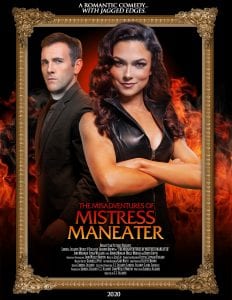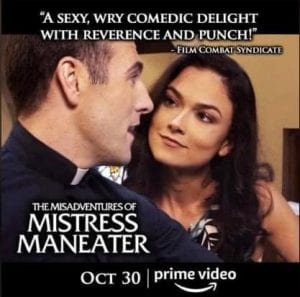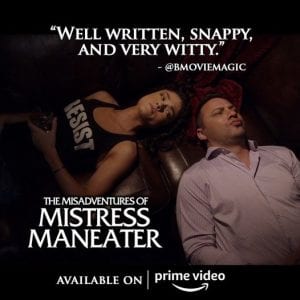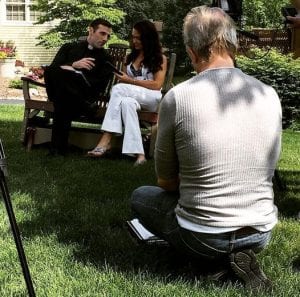 My friends Lorrisa & CJ just completed writing, producing, editing and starring in (for Lorrisa) the full length feature film, “The Misadventures of Mistress Maneater”.
My friends Lorrisa & CJ just completed writing, producing, editing and starring in (for Lorrisa) the full length feature film, “The Misadventures of Mistress Maneater”.
Their film is available to rent and buy on Prime Video or Vimeo on Demand. They can also follow our Facebook and Instagram handle, @mistressmaneatermovie,
This is the result of several years of hard work! I wanted to know where they found the discipline to keep at it and achieve their goal? Whether it’s creating a movie, running a marathon or losing that extra weight, it is hard to have the motivation each and every day it is needed. So, what tips and tricks can they offer us that they may have learned from creating the film? Here is what they had to say:
Lorrisa: I highly recommend Martha Beck’s “Finding Your Own North Star” for anyone searching for their purpose and happiness. She helps you discover and build a dream based on what truly makes your heart sing and energizes your spirit, not based on what we’re told by our colleagues, family, and society that we’re supposed to do, dream, and want in order to be successful and happy. I’d encourage people to think in terms of building empire, not just a figurative shack. A shack is easier, less risky, and doesn’t take as long, but neither will it be as fulfilling or in the long-term. Only build and embrace a dream that can keep you motivated for the duration, even if it takes three, five, ten years. So many things I was “supposed” to do to find success as a performer and writer sapped my soul over time and I finally stopped. Then I was able to focus on what truly energized me, even if my chosen path seemed like a nonsensical pipe dream to others.
 It was similar to when I needed to get fit and lose weight a decade ago. I tried the quick fixes, but they didn’t work and left me frustrated. Instead, I focused on the long game—making small lifestyle changes I could embrace long-term, finding ways to enjoy the gym activities I previously disliked, making new habits over time, and becoming a gymrat. I stopped focusing on losing ten pounds to look like I did before and instead decided, “I going to become Linda Hamilton from Terminator 2 and open up a whole new world for myself physically and professionally.” While I recognized that I’m not a “workout class” or “workout buddy” person, twice throughout the last decade when I hit a plateau, got bored, or had a special goal for a particular project, I’d work for a few months with a trainer for extra challenge and mental stimulation.
It was similar to when I needed to get fit and lose weight a decade ago. I tried the quick fixes, but they didn’t work and left me frustrated. Instead, I focused on the long game—making small lifestyle changes I could embrace long-term, finding ways to enjoy the gym activities I previously disliked, making new habits over time, and becoming a gymrat. I stopped focusing on losing ten pounds to look like I did before and instead decided, “I going to become Linda Hamilton from Terminator 2 and open up a whole new world for myself physically and professionally.” While I recognized that I’m not a “workout class” or “workout buddy” person, twice throughout the last decade when I hit a plateau, got bored, or had a special goal for a particular project, I’d work for a few months with a trainer for extra challenge and mental stimulation.
No passionate effort in life is ever wasted. My fitness journey directly and indirectly shaped the story of our movie as well. I took Shotokan Karate to enhance my performance capture work with the Mortal Kombat videogame franchise, and that directly inspired the MMA lead character in our movie, Father Radovan Markovic, wonderfully played by actor Mickey O’Sullivan.
 Also, I didn’t work on this movie nonstop for five years. When I’ve done all I can do for a project and then hit a wall when bringing it to the world, meet nothing but resistance, I’ve learned to pivot, and it’s kept me growing and expanding my interests and abilities in the arts. “The Misadventures of Mistress Maneater” started as a screenplay in 2014, barely recognizable today. After getting professional notes and feedback, which I found discouraging at the time and unable to apply, I took a break to work on other projects—always the best therapy when I hit a wall or feel burned out—and came back a year later to apply those notes with fresh eyes and rewrite it as a novel. When I took that version as far as I could on my own, I again pivoted to another project, and came back to refine the novel into a screenplay again. My best work always takes time, distance, and reflection. Some writers force themselves to work every day. I have in the past, and know that sometimes my resistance to that discipline is more about fear and self-doubt. When I pinned my butt in the chair and wrote anyway, the muse was there for me.
Also, I didn’t work on this movie nonstop for five years. When I’ve done all I can do for a project and then hit a wall when bringing it to the world, meet nothing but resistance, I’ve learned to pivot, and it’s kept me growing and expanding my interests and abilities in the arts. “The Misadventures of Mistress Maneater” started as a screenplay in 2014, barely recognizable today. After getting professional notes and feedback, which I found discouraging at the time and unable to apply, I took a break to work on other projects—always the best therapy when I hit a wall or feel burned out—and came back a year later to apply those notes with fresh eyes and rewrite it as a novel. When I took that version as far as I could on my own, I again pivoted to another project, and came back to refine the novel into a screenplay again. My best work always takes time, distance, and reflection. Some writers force themselves to work every day. I have in the past, and know that sometimes my resistance to that discipline is more about fear and self-doubt. When I pinned my butt in the chair and wrote anyway, the muse was there for me.
Other times, though, I have to recognize that the muse is gone and forcing the writing will only result in inferior,  discouraging work. Then I examine the reasons the muse has fled—perhaps I’m forcing my story into a 90-page feature film script when it really wants to be a novel or a long-form series in order to satisfactorily explore each relationship and arc. Perhaps I’m distracted with life events and other commitments that keep my unconscious mind from chewing on and spitting out great ideas. In which case, I have to adjust my habits and environment—less social media, fewer distractions—or stop beating myself up for not writing and instead wait for the muse to return at a later date. Or perhaps I’ve been so concerned with output that I haven’t refilled my creative well and need to feed my brain and heart with inspiration from other artists, performers, and filmmakers. Being “in flow” is the greatest feelings I’ve had as a creative, and athletes can relate to when they’re in “the zone.” That’s when magic happens and ideas appear from the ether. In the case of “The Misadventures of Mistress Maneater,” the song in the theatre scene filmed at Valparaiso’s Memorial Opera House was inspired by a dream.
discouraging work. Then I examine the reasons the muse has fled—perhaps I’m forcing my story into a 90-page feature film script when it really wants to be a novel or a long-form series in order to satisfactorily explore each relationship and arc. Perhaps I’m distracted with life events and other commitments that keep my unconscious mind from chewing on and spitting out great ideas. In which case, I have to adjust my habits and environment—less social media, fewer distractions—or stop beating myself up for not writing and instead wait for the muse to return at a later date. Or perhaps I’ve been so concerned with output that I haven’t refilled my creative well and need to feed my brain and heart with inspiration from other artists, performers, and filmmakers. Being “in flow” is the greatest feelings I’ve had as a creative, and athletes can relate to when they’re in “the zone.” That’s when magic happens and ideas appear from the ether. In the case of “The Misadventures of Mistress Maneater,” the song in the theatre scene filmed at Valparaiso’s Memorial Opera House was inspired by a dream.
 Also, the true enjoyment has to come in the work itself. While I’d edited for clients in the past, I discovered, to mine and everyone else’s surprise, that I absolutely loved editing my own feature, and cutting the music—giving the film its emotional ebbs and flows so the audience could feel what I felt—was thrilling and life affirming. It was the exciting, enjoyable, and least stressful part of the filmmaking process, much like the initial writing. In both cases, I was able to take my time building every moment with laser focus, just the creator and her screen. I think we can all relate to finding unexpected joy in an activity that seems unglamorous to others, or that we’d never imagine could fill our souls.
Also, the true enjoyment has to come in the work itself. While I’d edited for clients in the past, I discovered, to mine and everyone else’s surprise, that I absolutely loved editing my own feature, and cutting the music—giving the film its emotional ebbs and flows so the audience could feel what I felt—was thrilling and life affirming. It was the exciting, enjoyable, and least stressful part of the filmmaking process, much like the initial writing. In both cases, I was able to take my time building every moment with laser focus, just the creator and her screen. I think we can all relate to finding unexpected joy in an activity that seems unglamorous to others, or that we’d never imagine could fill our souls.
As a lifelong overachiever, I find that the aftermath of finishing a project isn’t nearly as gratifying or fulfilling as we’re led to believe it’ll be by our culture. It’s like a drug in the brain—you’ll need a bigger and bigger hit, or a bigger and bigger accomplishment, only to feel less and less happiness from completion. I usually feel relief more than joy upon completion, and have learned that I’m happiest when I’m actively working on a story.
Thanks so much for this lovely article on the very fabulous Lorrisa Julianus!